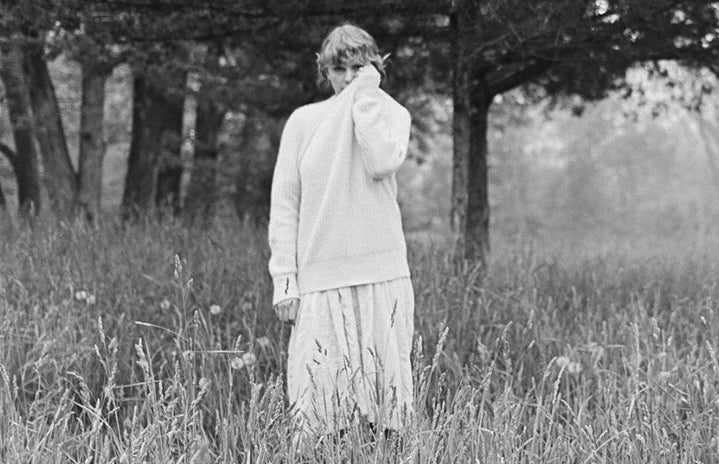When Taylor Swift announced the impending release of her eighth album, folklore, on July 23rd, I had no idea the absolute artistry that was about to grace my ears. Since its release, folklore has been on repeat exclusively, whether or not those around me want to hear it. My coworkers all summer said, “Belle, really, again?” To them, I say ‘yes, again.’
I’m not the only one, either. Folklore was streamed over 80 million times, (allegedly not all by me) in its first 24 hours on Spotify alone — the biggest album debut for a female artist ever on the streaming service, according to Music Business Worldwide. In fact, it is the best selling album since Swift’s seventh album, Lover, was released just one year ago.
Folklore doesn’t pull any punches, it is a Russian roulette of emotions. Want to experience breathtaking nostalgia? Play august. Prefer a melodic duet of unending sadness? Play exile. A side of heart-wrenching queer imagery, anyone? Play illicit affairs. It is nearly impossible in a quantifiable sense to determine what Swift’s best work is, but this album is undoubtedly up there. Her ability to tell a story in a song has always been admirable, but her lyricism reaches new heights on folklore.
The pervasive theme throughout the album is young love in all its complexities, tenderness and fragility. Swift confirmed this inference when she revealed there is a three-song “teenage love triangle” arc, (though she did not name the songs, listeners point to cardigan, august and betty). Swift sings through these experiences from song to song, it all feels profoundly honest and reflective.
“It is clear that she has quite a bit of perspective writing about these stories as a 30-year-old woman,” says Halley Ritter, a Swift fan. “She’s capable of expressing the nuance of people going through intense relationships for the first time.”
Though much of the album is spent lamenting young heartbreak, simultaneously, Ritter feels both comforted and reassured. Though specifically, “I feel slapped in the face by the specificity of her lyrics, I also feel she is swaddling me in a baby blanket,” she explains.
In august, Swift sings about the naivety of teenage love and first sexual experiences from a self-aware understanding that it will end and it will hurt, but she wants it anyway, (“wanting was enough/ for me, it was enough/ to live for the hope of it all/ cancel plans just in case you’d call”). She sings on cardigan about how people doubted her love because she was young (“when you are young, they assume you know nothing”) but admits as the character ‘James’ on betty that “I’m only seventeen, I don’t know anything.” These lyrics and stories so perfectly encapsulate the contradicting feelings of being a teenager in love, feeling deeply, but perhaps unaware of how to navigate the situation.
Listeners have pointed to Swift’s maturity in this album, a sense of growth that is only enhanced by her talent. Notably, the fact that she is in a long term relationship and is still able to write with precise palpability on matters of love and heartbreak.
“She’s at a point in her life where she can easily see the past because we all know that heartache is really disorienting. Now that she’s healed…I think she can more objectively see how beautiful it was rather than painful to be in such strong love in her relationships,” singer-songwriter Syd Kurbis of Lilac Jam says.
From her artistic perspective, Kurbis says a lot of songwriters encounter a shift when they no longer have the inspiration to write about sadness or hardship. They begin seeing writing as storytelling with characters when they are satisfied with their life.
Obviously, a lot of music discusses and laments young love and heartbreak, Ritter says, but the way with which she approaches it with this album is unique and very different. This shows Swift’s grasp of what young, fleeting relationships are like and in turn her ability to tap into them in such a personal way.
“As a [visual] artist, I know that the struggle is always trying to make the personal universal. To make work that people can look at and feel intimately connected to, but not in a way that is exclusionary,” Ritter explains.
Swift’s stories have a balancing blend of both nostalgia and melancholy lyrics, supporting what Ritter describes as a main idea of the album, presenting situations of having these big, outsized feelings and not quite knowing how to navigate them.
“It encourages the listener to understand that though it feels like these are very specific feelings and situations, everyone goes through them,” she says.
The universality of Swift’s music has never been so lauded- many passionate listeners have claimed folklore as canonically queer.
How does Swift achieve this feat, being so outwardly heterosexual herself? It is all about the motif of yearning that’s woven throughout the album, says queer listener Anna Abraham.
“I think a lot of younger millennial women grew up listening to Taylor Swift. Somehow her music was lined up perfectly with my own growth…[the] hope in her music reflects what I’m going through,” Abraham says, “especially right now when everything is so chaotic, her music is so soothing.”
Abraham points specifically to august and betty as illustrating queer stories the best, the latter of which is sung from the perspective of ‘James’ to ‘Betty.’ Though, fans quickly pointed out Swift herself is named after James Taylor, thus blurring the gendered lines of the various perspectives in her songs. Is the James in betty cleverly referring to Swift herself?
“Queer swifties are so committed to finding the sapphic easter eggs in Taylor’s music,” Abraham explains.
The ambiguity of the characters along with the specificity of emotions produces an album that paradoxically is both deeply universal and simultaneously acutely personal.
“Every time I listen to it I am amazed by the depth that she creates and how incredibly real they are. What a lovely tribute the whole album is to young love and young relationships,” Ritter concludes.



